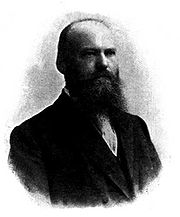
Ferdinand Hueppe
Encyclopedia

From 1872 to 1876, Hueppe studied medicine at the University of Berlin, and afterwards served as a military surgeon
Surgeon
In medicine, a surgeon is a specialist in surgery. Surgery is a broad category of invasive medical treatment that involves the cutting of a body, whether human or animal, for a specific reason such as the removal of diseased tissue or to repair a tear or breakage...
. From 1880 to 1884 he was a member of bacteriologist Robert Koch
Robert Koch
Heinrich Hermann Robert Koch was a German physician. He became famous for isolating Bacillus anthracis , the Tuberculosis bacillus and the Vibrio cholerae and for his development of Koch's postulates....
's staff in Berlin
Berlin
Berlin is the capital city of Germany and is one of the 16 states of Germany. With a population of 3.45 million people, Berlin is Germany's largest city. It is the second most populous city proper and the seventh most populous urban area in the European Union...
, and later worked at the Chemischen Institut Fresenius
Carl Remigius Fresenius
Carl Remigius Fresenius , was a German chemist, known for his studies in analytical chemistry.- Biography :Fresenius was born on 28 December 1818, in Frankfurt, Germany...
in Wiesbaden
Wiesbaden
Wiesbaden is a city in southwest Germany and the capital of the federal state of Hesse. It has about 275,400 inhabitants, plus approximately 10,000 United States citizens...
. From 1889 to 1912 he was a professor at Charles University in Prague
Charles University in Prague
Charles University in Prague is the oldest and largest university in the Czech Republic. Founded in 1348, it was the first university in Central Europe and is also considered the earliest German university...
.
Hueppe is remembered for his pioneer investigations of hormesis
Hormesis
Hormesis is the term for generally favorable biological responses to low exposures to toxins and other stressors. A pollutant or toxin showing hormesis thus has the opposite effect in small doses as in large doses...
in regards to chemical stimulation/inhibition of bacterial growth. The eponymous "Hueppe’s Rule" is an historical term for hormesis.

